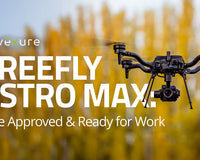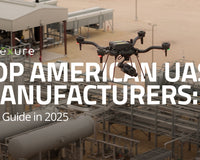In the ever-evolving landscape of drone technology, the American Security Drone Act (ASDA), included within the National Defense Authorization Act (NDAA), has emerged as a pivotal piece of legislation with significant implications for public safety, federal entities, and other government agencies. In this Advexure Insider blog, we’ll explore what it is, how it affects you, and what you can do in response.
What is the ASDA?
The American Security Drone Act (ASDA) emerged against growing concerns over national security, particularly the potential vulnerabilities introduced by integrating foreign technology into America’s critical infrastructure. The legislation targets drones from specific foreign entities, most notably Chinese manufacturers like DJI and Autel Robotics, aiming to mitigate perceived security risks. However, the inception of the ASDA is mired in controversy, with skepticism about its true motivations.
Critics of the ASDA argue that the legislation tries to address a speculative threat, constructing a narrative of vulnerability around foreign-made drones without substantial evidence. This skepticism is not unfounded, as independent audits, including those conducted by reputable American institutions, have repeatedly validated the security measures employed by DJI.
Compounding this skepticism is American drone manufacturers’ involvement and recent lobbying efforts. There is a growing discourse that the Act might be less about national security and more about economic protectionism. The drone industry, marked by intense global competition, sees American and Chinese companies vying for dominance. In this context, some view the ASDA as an attempt by American manufacturers to use legislative means to curb the competition, effectively sidelining foreign players under the guise of national security.
Debunking Myths and Misconceptions
Understanding the American Security Drone Act (ASDA) also includes dispelling common misconceptions clouding public perception. The belief that the ASDA signals the end for prominent Chinese drone manufacturers like DJI and Autel Robotics in the U.S. market is central to these misconceptions. It’s important to clarify that the primary focus of the ASDA is on restricting federal agencies from using federal funds to procure drones from certain foreign entities, not banning these drones outright for all users.
Misconception 1: The End for DJI and Autel in the U.S.
The narrative that DJI and Autel drones will no longer be available or operable in the U.S. is misleading. The ASDA’s restrictions apply specifically to federal agency procurements with federal funding. Private individuals, state or local government entities, and commercial enterprises are exempt from the ASDA as long as federal funding is not involved.
Misconception 2: Security Risks are Exclusive to Foreign Drones
Another widespread myth is the purported inherent security risk of foreign-manufactured drones, particularly those from China. This assumption overlooks the extensive independent audits and validations that drones like DJI have undergone. These assessments, conducted by reputable organizations, have consistently failed to substantiate claims that these drones pose a unique or unmanageable security threat.
Misconception 3: Lack of Data Security Measures
The assumption that Chinese-made drones lack robust data security measures is another myth that needs clarification. DJI, for instance, has been proactive in providing users with comprehensive control over their data. Features such as local data mode and offline operating underscore the company’s commitment to user data privacy and security.
Assessing the Impact on the UAS Industry
Limitation of Choices and Innovation
One of the most immediate concerns is the limited choices for federal agencies. The ASDA could inadvertently stifle innovation by restricting access to a broad range of drone technologies, particularly those that have become industry standards for performance and reliability. The competition, a driving force behind technological advancements, may be dampened if leading players like DJI and Autel Robotics are sidelined in the federal sphere. This could lead to a slower pace of innovation for the drones themselves and the ancillary technologies and services that have grown around these platforms.
Impact on Public Safety and Critical Operations
The potential impact of the ASDA extends into critical areas such as public safety, emergency response, and law enforcement. Drones have become indispensable tools for public safety, offering capabilities that significantly enhance operational effectiveness and safety at a reduced cost. Restrictions that limit the availability of advanced, reliable drone technologies could compel agencies to settle for less capable alternatives. This is particularly concerning in scenarios where the performance and reliability of drone technology can mean the difference between life and death. It’s also worth pointing out that the average budget for most public safety agencies is less than the overall cost of most American made options.
Economic Implications for Small Businesses and Contractors
The ASDA’s reach might also affect the economic landscape within the drone industry, particularly for small businesses, contractors, and service providers that have built their offerings around specific drone tech. These entities could face challenges in adapting to a market where the rules have shifted, potentially leading to increased costs, reduced competitiveness, and a need to retool or retrain to align with new, approved technologies.
Assessing the Impact on the UAS Industry
Law Enforcement and First Responders
Currently, the ASDA’s impact on law enforcement and first responders is minimal. Agencies and departments can continue to procure and operate drones from manufacturers like DJI and Autel Robotics without the constraints imposed on federal agencies.
In short, DJI and Autel are allowed for public safety if the procurement and operation of these drones are not federally funded.
Tribal Law Enforcement and Emergency Agencies
Tribal law enforcement enjoys unique exceptions, ensuring they can continue to support their operations with the necessary drone technology. This exemption is vital for maintaining the autonomy and operational effectiveness of tribal law enforcement and emergency services. It allows them to utilize drones for various applications, from monitoring vast and rugged terrains to conducting SAR operations.
Wildfire Management and SAR Operations
Federal agencies engaged in SAR and wildfire management operations are not restricted by the ASDA, allowing them to continue using the most effective drone technologies available, regardless of their country of origin.
Continuity of Arrangements Provision
The “Continuity of Arrangements” provision is an important concession within the ASDA. This provision safeguards the federal government’s ability to engage in contracts, grants, and cooperative agreements with law enforcement and emergency service agencies, provided they have an exemption or waiver. This ensures that even with the ASDA’s restrictions, there remains a pathway for federal agencies to collaborate with and support state, local, and tribal entities in their drone operations, preserving the flow of resources and technology necessary for critical public safety and emergency response activities.
Data Security Concerns: Fact or Fiction?
A contentious point of the ASDA is the alleged security threat posed by Chinese-made drones. Independent audits and validations, including those conducted by the Department of Commerce and Idaho National Laboratory, have found no substantial evidence to support these claims.
The narrative that Chinese-made drones, such as those produced by DJI, pose inherent national security risks has been a central argument for proponents of the ASDA and NDAA. However, this claim warrants serious scrutiny, especially in light of numerous independent audits and investigations that have assessed the cybersecurity measures of these drones. For instance, studies conducted by entities like the Department of Commerce and the Idaho National Laboratory have provided nuanced insights, often concluding that the data security risks associated with these drones are not significantly more significant than those associated with any connected technology.
Navigating Exemptions and Waivers
Understanding the Scope of Exemptions
The legislation carves out exceptions for departments like Homeland Security, Defense, and Justice, among others, under specific conditions that align with national interests. These exemptions are crucial for maintaining the continuity of operations that rely heavily on drone technology, such as counterterrorism efforts, cybersecurity, and electronic warfare.
The Exemption Criteria
Exemptions under the ASDA are not granted indiscriminately but are subject to stringent criteria. For instance, the Department of Defense may procure foreign-made drones if the procurement is deemed essential for national interest, and the drones are used exclusively for research, evaluation, training, testing, or analysis in specified areas such as electronic and information warfare. Similarly, entities like the Department of Transportation and the Federal Aviation Administration are exempted from operations critical to maintaining public safety or ensuring the efficient operation of the National Airspace System.
The Waiver Process
The waiver process introduced by the ASDA provides a vehicle for federal agencies to seek permission to use restricted drones under certain conditions. This process involves a detailed review and approval by the heads of the agencies in collaboration with the Office of Management and Budget and the Federal Acquisition Security Council.
Case-by-Case Consideration
Waivers are reviewed case-by-case, allowing for a nuanced assessment of each application. This approach recognizes various federal agencies’ diverse needs and operational contexts, ensuring that waivers are granted based on a thorough understanding of the specific requirements and the security implications of using the requested UAS technology.
Advexure’s Commitment to Advocacy and Support
As a member of the Drone Advocacy Alliance, Advexure stands at the forefront of efforts to ensure a fair, informed, and balanced discourse around drone legislation. We are dedicated to protecting the interests of our customers and the broader drone community, advocating for policies that support innovation, safety, and the responsible use of drone technology.
Engage, Inform, Advocate
In light of the ASDA and its potential ramifications, it’s more important than ever for stakeholders in the drone industry to stay informed, engaged, and proactive in shaping the future of drone regulation. By participating in advocacy efforts and contributing to a constructive dialogue, we can work together to ensure that drone technology continues to serve as a valuable tool for public safety, commercial innovation, and recreational enjoyment.
In Conclusion
The American Security Drone Act represents a critical intersection of technology, policy, and security. By debunking misconceptions and understanding their practical implications, we can navigate these regulatory landscapes with confidence and clarity. Advexure remains committed to empowering our customers and the wider drone community with the knowledge, resources, and support needed to thrive in this dynamic landscape. At the end of the day, the majority of public safety professionals don't care about where the origin of UAS is from, they care about saving lives with the most effective solutions and having easy access to those solutions
For more information on how you can get involved and support the drone community’s advocacy efforts, visit the Drone Advocacy Alliance at Drone Advocacy Alliance. Your voice shapes a regulatory environment that fosters growth, innovation, and safety in the drone industry.










